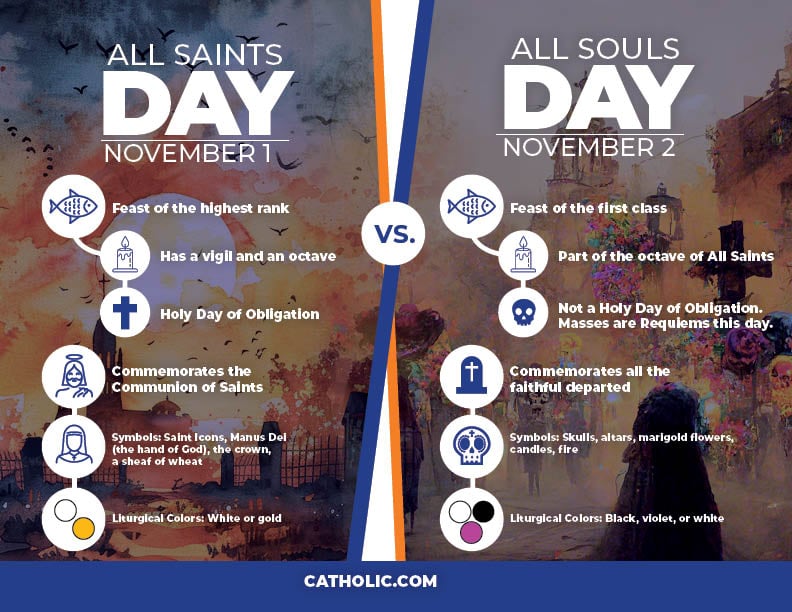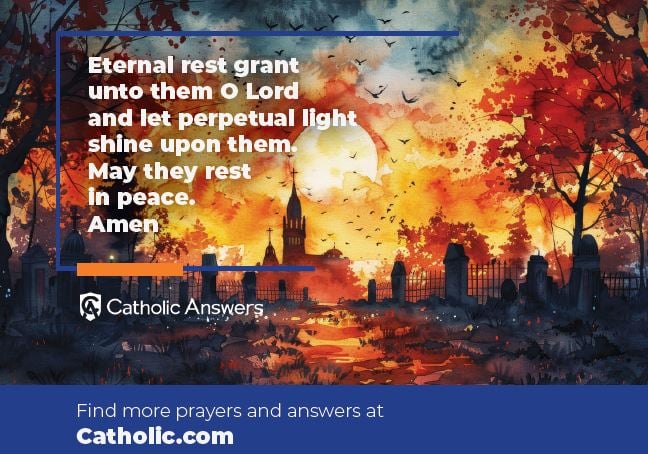
Honoring the Departed: All Souls’ Day and Día de los Muertos
Would you like to learn about All Souls Day and Day of the Dead (día de los Muertos) in Spanish? Read all about Día de los Muertos here!
What Is the Purpose of All Souls Day?
All Souls Day, celebrated on November 2, is a day set aside in the Roman Catholic Church to pray for the souls in purgatory. (Eastern Catholics celebrate five All Souls Saturdays, which occur before and during Lent, and on the Saturday before Pentecost.) The Church teaches that purgatory is a temporary state of purification for those who have died in God’s grace but still carry the effects of venial sins (forgiven and unforgiven) and forgiven mortal sins. The faithful on earth are called to offer prayers, sacrifices, and Masses to help these souls attain the beatific vision—eternal life with God in heaven. This day emphasizes the doctrine that many of the souls of the faithful departed need our prayers as they complete their purification.
What’s the Difference Between All Saints Day and All Souls Day?
Though these days fall back-to-back in the liturgical calendar, All Saints Day (November 1) and All Souls Day (November 2) have distinct purposes. All Saints Day is a holy day of obligation, on which Catholics honor all the saints—both canonized and uncanonized—who have reached heaven and enjoy the beatific vision. It’s a day to remember those who serve as models of holiness. On the other hand, All Souls Day is a day of commemoration for all the faithful departed, particularly those still in purgatory, who are awaiting full sanctification.
Download All Saints Day vs. All Souls Day PDF Infographic
Is All Souls Day Only for Catholics?
While All Souls Day is primarily a Roman Catholic observance—and observed on five All Souls Saturdays by Eastern Catholics, as noted above—its traditions extend to other Christians, including some Anglican and Lutheran denominations. However, it is rooted in Catholic doctrine, especially the belief in purgatory and the efficacy of praying for the dead. Catholic teaching encourages the faithful on earth to intercede for the dead, as it is seen as a charitable act of mercy.
Is All Souls Day for the Dead?
Yes, All Souls Day is entirely dedicated to the souls of the faithful departed. It is a day when Catholics believe that the Church Militant (the faithful on earth) can assist the Church Suffering (souls in purgatory) through prayer, sacrifices, and offering Masses on their behalf. It is a day to remember our deceased loved ones, pray for their repose, and reflect on our mortality. Those prayers can also include asking for the intercession of the Church Triumphant (the saints in heaven).
What Happens When We Die?
Why Do the Saints Need Purification After Death? Hasn’t Jesus Already Accomplished This for Them?
Purgatory, in which is rooted the commemoration of All Souls Day, is often a big stumbling for Protestant Christians. They argue it’s contrary to the biblical teaching that Jesus’ one sacrifice of Calvary is sufficient for atoning for our sins (see, e.g., Heb. 9:12; 10:14; 1 Pet. 3:18). However, they fail to distinguish between the objective work of Christ’s sacrifice of Calvary and our subjective appropriation of his redemptive work, which requires our initial and ongoing free-will response. Indeed, Jesus says we must be baptized to become his disciples (Matt. 28:18-20; see 1 Pet. 3:21; Acts 22:16); and that we also need to have forgiven the sins we commit after we’re baptized, with the apostles and their successors specially designated to forgive or retain the sins of the faithful (John 20:21-23).
In other words, salvation is a process. Part of that process can include purgation after we die. Jesus atones for the eternal punishment of our sins, as only he as God can, but he calls us to unite with him in remitting the temporal punishment, which can include fully detaching from our attachment to the bad habits we’ve cultivated while living on earth. Real love is a two-way street, and thus calls for a response in kind. Jesus wants to truly rehabilitate us by enabling us to love as he does—unconditionally and sacrificially—and Jesus helps us do so through our self-denying and redemptive cooperation with him.
The Bible gives various evidence for purgatory, including in 1 Corinthians 3:10-15 and Luke 12:41-48, 57-59 (see Matt. 12:32). We also know from Scripture that all the faithful are united in the Mystical Body of Christ and thus concerned for one another (1 Cor. 12:12-26). And so we pray for our brothers and sisters in Purgatory. And if the prayer of a righteousness man on earth has much power (Jas. 5:16), how much more do those of the saints in heaven have? (Rev. 5:8; see Heb. 12:23). Through All Souls Day, the Church continues this biblical tradition by calling for prayers for those who have died. For more scriptural support on Purgatory, read our related tract.
What Other Biblical Support Is There for Celebrating All Souls Day?
While the Bible does not explicitly mention “All Souls Day,” the practice of praying for the dead has other biblical roots. In 2 Maccabees 12:46, Judas Maccabeus prays for the fallen soldiers who had died with sin. This passage is one of the key scriptural bases for the doctrine that the souls of the dead benefit from our prayers. In addition, in 2 Timothy 1:16-18, Paul prays for the soul of Onesiphorus, which also affirms that the dead can profit from our prayerful intercessions. Thus, the Church encourages this commemoration as a practice consistent with biblical faith.
What Is the Day of the Dead Celebrated for?
The Day of the Dead, or Día de los Muertos, is a Mexican celebration deeply connected to All Souls Day. It is a day to honor and remember deceased loved ones, combining pre-Columbian traditions with Roman Catholic practices. Families decorate the graves of the deceased, create ofrendas (altars), and celebrate with food and music, symbolizing the belief that the dead remain spiritually united with the community.
What Is the Purpose of Ofrendas in Día de los Muertos?
The ofrendas, or altars, created during Día de los Muertos are a central part of the celebration. They serve to honor the deceased and symbolize our prayers for their purification, knowing that we remain intimately united to them in the Mystical Body of Christ. These altars typically include photos of the deceased, skulls, candles, marigold flowers, and items that the departed loved during their lives. While it’s rooted in Mexican tradition, the celebration still reflects the Catholic practice of praying for the dead.
Why Are There Two Days Celebrating the Day of the Dead?
In Mexican tradition, the Day of the Dead is celebrated over two days—November 1 (coinciding with All Saints Day) and November 2 (All Souls Day). November 1 is typically for remembering baptized children and infants who have died, known as Día de los Inocentes, while November 2 is reserved for honoring adults. (The former is distinguished from Día de los Santos Innocentes [Feast of the Holy Innocents], which the Church commemorates universally on December 28.)
How Do Catholics Celebrate All Souls Day?
Catholics celebrate All Souls Day through various practices, including participating in Mass, lighting candles in prayer, visiting cemeteries to decorate the graves of loved ones, and offering prayers for the dead. Many Catholics pray the All Souls Day prayer, which expresses the hope that the souls in purgatory will soon be freed from purgatory and welcomed into heaven.
All Souls Day Prayer
Eternal rest grant unto them, O Lord,
and let perpetual light shine upon them.
May the souls of the faithful departed,
through the mercy of God, rest in peace. Amen.
Eternal Rest Prayer Card – Free Printable Download
Do I Get a Plenary Indulgence When I Go to Mass on All Souls Day?
A caller into our radio program asked a very popular question. Hear Father Hugh Barbour give the Catholic answer (35:59)!
I understand we get a plenary indulgence if we go to mass on All Souls’ Day. What do we have to say or do for it? Also, if we pray at a cemetery, do we get a second indulgence?
In the month of November, the Catholic Church provides many opportunities to reflect on death, purgatory, and eternal life. From prayers for the dead to decorating graves and lighting candles, Catholics offer these acts of devotion in the prayerful hope that all souls will be united with God in heaven. Inspired by St. Odilo of Cluny, who established the commemoration of all the faithful departed in the tenth century, All Souls Day remains a profound expression of the Church’s enduring love for its members—both living and dead.
Additional Resources for All Souls Day [Day of the Dead]
Momento Mori: Why You Should Remember to Die
Last Call: The Catholic Teaching on Death-Judgement-Heaven-Hell (MP3)
Catholic Encyclopedia: All Souls Day
Purgatory from the Other Side (MP3): What the Saints and Holy Souls Reveal About Our Cleansing Before Heaven
Catholic Answers Wants to Pray for Your Intentions
We will include your intentions at our weekday Masses here at the Catholic Answers Chapel. Use this simple form to submit your All Souls Day prayer intention (form takes a few seconds to send before you see the “thank you” message.)




